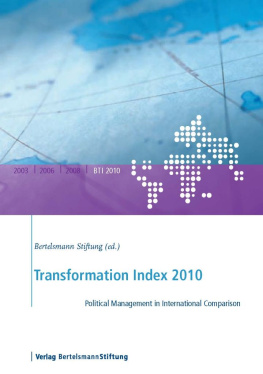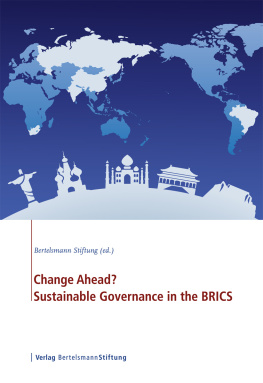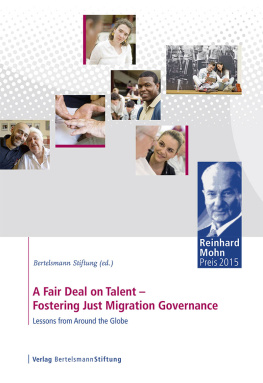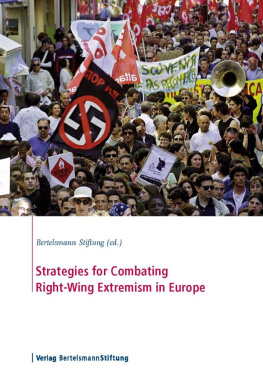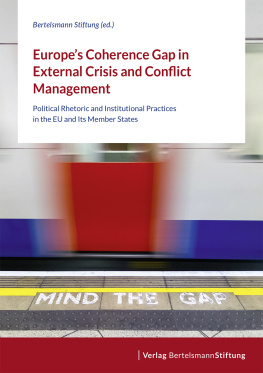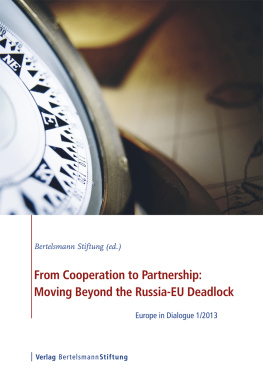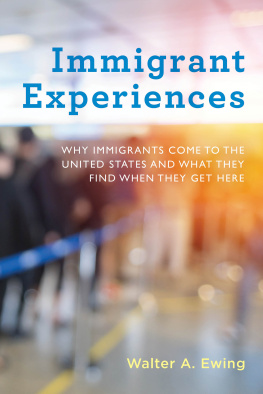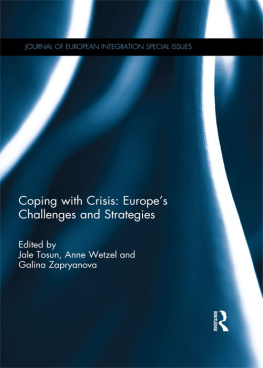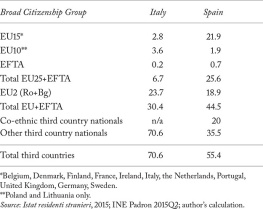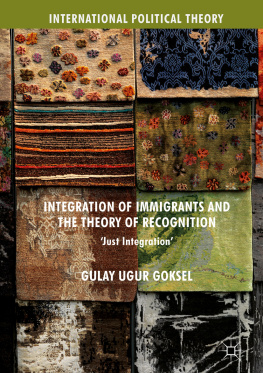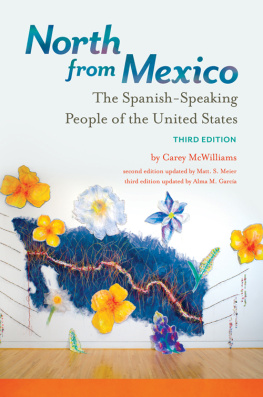Bibliographic information published by the Deutsche Nationalbibliothek
The Deutsche Nationalbibliothek lists this publication in the
Deutsche Nationalbibliografie; detailed bibliographic data
is available on the Internet at http://dnb.d-nb.de.
2011 E-Book-Ausgabe (EPUB)
2010 Verlag Bertelsmann Stiftung, Gtersloh
Responsible: Dr. Christal Morehouse
Copy editor: Michelle Mittelstadt
Production editor: Christiane Raffel
Cover design: Nadine Humann
Cover illustration: Thomas Kunsch, Bielefeld
Typesetting and Printing: Hans Kock Buch- und Offsetdruck GmbH, Bielefeld
ISBN : 978-3-86793-303-2
www.bertelsmann-stiftung.org/publications
www.bertelsmann-stiftung.de/verlag
Table of Contents
Introduction
The Transatlantic Council on Migration
First convened in 2008, the Transatlantic Council on Migration is a unique deliberative and advisory body that aims to have a tangible, measurable impact on migration and immigrant integration policy on both sides of the Atlantic. The Councils principal policy partner in this effort is the Bertelsmann Stiftung. The Council, an initiative led by the Migration Policy Institute and convened by MPI President Demetrios G. Papademetriou, is generously supported by the Carnegie Corporation of New York, the Open Society Institute, the Bertelsmann Stiftung, the Rockefeller Foundation, the Ford Foundation, the Barrow Cadbury Trust, the Luso-American Development Foundation, the Calouste Gulbenkian Foundation and the governments of Germany, the Netherlands and Norway. More information about the Councils membership, operations and publications can be found at: www.migrationpolicy.org/transatlantic.
In the wake of the Great Recession, countries on both sides of the Atlantic must confront two competing realities: increased integration needs and vastly reduced spending capacity. Whats more, there is little public appetite for investing in immigrants at a time when many native-born citizens are experiencing soaring unemployment and there is ever greater competition for societys resources. Yet, as immigration continues to shape our societies, better integration is a critical component for future economic growth.
At its fourth plenary meeting, held in Bellagio, Italy, in May 2010, the Transatlantic Council on Migration deliberated on how to make smart investments in immigrant integration at a time of reduced budgets by assessing where the greatest needs and opportunities are. Where have immigrants been hit the hardest? At what point in the immigration arc are investments most effective? How should politicians speak about immigrant integration in order to garner public support? And what effect will reduced funding have on the laws and practices that shape immigration and immigrant integration?
To answer these questions, the Council convened senior policymakers and experts from Europe and North America to come up with a series of strategies and recommendations that can help farsighted policymakers rebuild robust economies and improve social cohesion during the long recovery ahead. The Council also convened a high-level education symposium in advance of its plenary meeting to hone in on specific recommendations for optimizing mainstream school reforms.
This volume-the fourth major publication of the Transatlantic Council on Migration-is based on these discussions and the research commissioned for the Councils May 2010 meeting. All the contributions are original work. The book joins the first three Transatlantic Council books-Delivering Citizenship (November 2008), Talent, Competitiveness and Migration (April 2009) and Migration, Public Opinion and Politics (November 2009)-in offering an evidence-based, pragmatic approach to the most complex and controversial policy debates surrounding migration.
There are three sections to this volume. Part One begins with the Council Statement on Immigrant Integration-Priorities for the Next Decade, which synthesizes the primary recommendations to emerge from the fourth meeting of the Transatlantic Council on Migration from May 5-7, 2010 in Bellagio, Italy. Although the Statement reflects the deliberations of the Council, the final responsibility for its contents rests with its authors.
Part Two analyzes where and how immigrants have been affected by the economic crisis. On both sides of the Atlantic, deep recession and the threat of a protracted recovery with ongoing high unemployment are having profound implications for immigration, immigrants and whole communities. This section maps out what we know about the recessions impact on immigrants, covering areas such as employment outcomes, educational performance, government investments in integration and political extremism.
Demetrios G. Papademetriou, Madeleine Sumption and Aaron Terrazas begin Part Two with their chapter on Recovering from Recession: Immigrants and Immigrant Integration in the Transatlantic Economy. In many countries, the years of economic expansion prior to the recession witnessed a greater openness toward immigration. In particular, some countries saw large inflows of immigrants into lower-skilled occupations, policies that are now being thrown into question. With contributions from Carola Burkert, Stephen Loyal and Ruth Ferrero-Turrin, this chapter explores five country case studies-Germany, Ireland, Spain, the United Kingdom and the United States-and illustrates the very wide variation among advanced industrialized nations, both in terms of macroeconomic impacts and outcomes for different immigrant groups. At the same time, immigration-receiving countries in the transatlantic sphere face many of the same integration challenges as they move beyond the global economic crisis.
Aaron Terrazas, Michael Fix and Margie McHugh explore effects on US education in chapter two, entitled Immigrant Students in US Schools and the Recession of 2007-2009. They find emerging evidence that the economic crisis has prompted a period of both painful adjustment and promising innovation in the nations elementary and secondary schools due to state-level fiscal crises and an unprecedented fiscal stimulus package. This chapter also focuses on how immigrant and limited English proficient (LEP) students were faring in US schools prior to the recession and how primary and secondary school education policies have evolved over the last few years.
The third chapter, by Miho Taguma and entitled Immigrant Students in OECD Countries during a Recession-Inspired Era of Resource Constraints, compares the educational outcomes of immigrant children to those of natives in Organisation for Economic Cooperation and Development (OECD) countries. The chapter highlights the importance of a whole-school approach-engaging teachers, school leaders, parents, communities and students-to improve equal opportunity and standards of excellence in schools and the long-term benefits of careful investments in education. This paper concludes with several points of action on how to improve education outcomes for students of immigrant origin.
Chapter four, entitled The Economic Crisis and Funding for Immigrant Integration in the United States, was co-authored by Randy Capps and Margie McHugh, with contributions by Monica Arciga, Michael Fix and Laureen Laglagaron. This chapter explores the impact of the crisis on funding for key services and programs that support the integration of immigrants and their families in the United States. It focuses on the five most populous US states-California, Texas, New York, Florida and Illinois-to understand their potential impact on prospects for furthering the integration of immigrants and their children.


